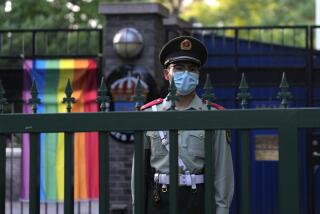China’s NGOs learn to stand alone
BEIJING — Wang Xingzui is trying to take the go out of his gongo.
Step by methodical step, the executive director of the China Foundation for Poverty Alleviation is weaning it from the things that have made his group an oxymoron: a government-organized nongovernmental organization, or gongo.
The foundation, one of China’s leading anti-poverty groups, has removed all but two of the government representatives on its 21-member board. It has stepped up fundraising efforts, though it still depends on government support. And it has revamped its micro-credit program, establishing independent loan offices to replace branches co-managed by provincial officials.
“We are quite unique,” Wang said proudly during an interview at his organization’s headquarters in Beijing.
The group’s attempt to assert its independence marks an important step forward in a country where the government has long been fearful of the kind of grass-roots revolution that toppled Communist regimes across Eastern Europe.
Lawrence Greenwood, vice president of the Manila-based Asian Development Bank, speaking at an anti-poverty forum here recently, said that the pioneering effort could “fundamentally reshape poverty alleviation and development efforts.”
*
A new attitude
Decades after opening its borders to foreign products and ideas, the Chinese government still maintains tight control over nongovernmental groups, whether they are chambers of commerce, churches or environmentalists. China has 350,000 registered nongovernmental organizations, but many thousands more, including most international organizations, operate without official approval.
Some lines can’t be crossed. Anyone posing a direct challenge to the Communist Party risks swift retaliation, as political bloggers, labor organizers and the followers of the spiritual movement Falun Gong have discovered.
But the Chinese government’s attitude toward nongovernmental groups has started to change. Concerned about the fast-widening rift between the rich and poor, President Hu Jintao has embarked on a campaign to build a more “harmonious society.”
In January, the Catholic Social Service Center of the Liaoning Diocese in northeastern China held the country’s first ecumenical conference on HIV/AIDS. Officials from China’s Ministries of Religious Affairs and Health attended the meeting, where the group adopted a plan to create a network of religious organizations to work on preventing the disease.
The NGO issue is something the Chinese government is “really struggling with,” said Elizabeth Williams, an AIDS expert at the New York office of the Asia Society. “It definitely appears that there is a recognition they need to foster, support and encourage civil society development. But there’s also a fear of how far that will go.”
The struggle to forge a new role for China’s nongovernmental groups is underway at the China Foundation for Poverty Alleviation, which makes its home in a well-worn building in a neighborhood of fast-food chains and clothing shops next to the People’s University.
The organization was founded in 1989 by retired provincial party officials who were looking for a way to help the government deliver services to poor villagers, Wang said. At first, he said, the group was set up as a mirror image of the government, a “mini Central Committee.”
But a decade of experience, and exposure to international anti-poverty organizations, convinced the foundation’s leaders that the organization needed to operate with greater independence so it could act more quickly and efficiently.
Wang stressed that his organization was not challenging the party’s authority, and in fact had the blessing of its government partners, the Ministry of Civil Affairs and the State Council’s Office of Poverty Alleviation and Development, with whom it maintains close contact.
“I am not advocating protesting against the government, not at all,” he said. “We want to see a strong NGO sector that will do things that can’t be done by the government or by business.”
After operating on the sidelines for so long, most Chinese nongovernmental groups lack the basic technical skills or business expertise necessary to deliver services on their own, Wang said. So in addition to managing its own restructuring, the foundation has begun offering training programs to other groups interested in taking the same path.
“I firmly believe one good NGO is not enough,” he said. “You need to help develop an NGO section in the civil society so the Chinese society will be a stable one.”
*
Project in Jiangxi
Chris Spohr, an economist with the Asian Development Bank’s office in Beijing, is working with the foundation on its collaboration with the government on poverty reduction programs in the southeastern province of Jiangxi. The foundation is helping select and train nongovernmental groups that are working with villagers to identify the root causes of their poverty and devise solutions.
Spohr said the project had been launched in Jiangxi because provincial leaders were willing to allow nongovernmental groups to work directly with the villagers. He said it was the first time the government had given anti-poverty funding directly to competitively selected NGOs, streamlining the process and reducing the opportunity for graft.
If the project succeeds, he said, it could help convince skeptical officials in other parts of China that these groups can be partners in solving some of their thorniest problems.
“We’re not talking about NGOs displacing governments,” he said. “We’re talking about bringing to bear their comparative strengths.”
The early results are encouraging, said Liu Dongwen, the foundation official in charge of the Jiangxi project. One group conducted a survey and determined that a proposed road should be rerouted so it would reach two remote villages. In another instance, a group helped a village resolve a contentious land dispute.
“In the past, villagers tended to think, ‘These are government projects -- why should I care?’ ” he said. “Now it’s changed. They think, ‘This is our project.’ ”
*
More to Read
Sign up for Essential California
The most important California stories and recommendations in your inbox every morning.
You may occasionally receive promotional content from the Los Angeles Times.









